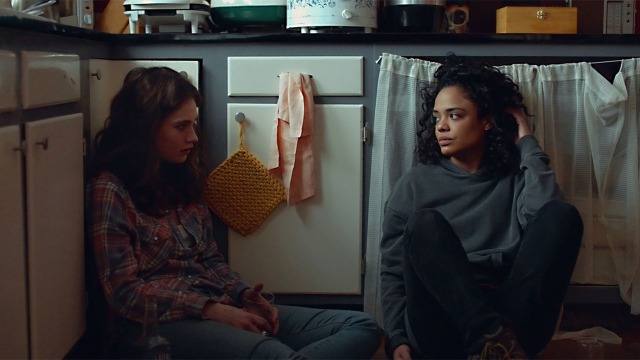A stark but auspicious feature debut arrives with Nia DaCosta’s Little Woods, a tale of two sisters stuck at the bottom on the economic food chain. In the depressed Dakotan landscape, DaCosta finds a spiritual abyss for abandoned souls, with its two central women risking the law to improve their lives by marginal degrees. The film is spare, its narrative stripped to its very dry bones in quintessentially American piece of traditional storytelling. But the film’s success lies in how underneath the oppressive coldness it reveals in our society, burns a will to prevail that spites our limitations.

Of the two adoptive sisters at its core, Little Woods hinges mostly on Tessa Thompson’s Ollie, a hardened survivor facing the final days of parole for drug trafficking charges. Her sister, Lily James’s Deb, squats in an abandoned mobile home with her son and faces an economically impossible pregnancy. Having dealt with the recent passing of their mother, Ollie and Deb must quickly secure the funds to stop the foreclosure of her home, luring Ollie dangerously back into the crime that she once did too easily. At stake isn’t just home and safety, but a chance for the freedom of a better future – Deb in the stability of their childhood home, and Ollie heading anywhere but here.
Little Woods vaguely riffs on the traditional western without reinforcing the genre’s toxicity, as its neo-revisionist peers like Hell or High Water did. It may still be a grim enterprise but not without its raw humanity. Ollie and Deb’s relationship is defined as one of need and accepting of its own thorns, given a past that alternately hinted or unspoken, but embedded in Thompson and James’ ease when sharing the screen. It’s not the warmest embodiment of sibling love, but its vigorous all the same.
The film adopts what could be interpreted as a moebius strip structure with its stoic opening and closing framing, one that maybe unlocks how much potential for optimism a viewer might take from DaCosta’s tough narrative. It’s one of the very few flourishes she allows, instead shaping a confident debut rather than one that shows off. It’s easy to imagine more complex thrillers in her hands given how sturdy and focused this one is. If its placidity leaves little room for surprise, DaCosta’s approach to her screenplay is never less than engaging.

And at the forefront of the film is two actresses delivering performances with honesty and without false notes. James gives Deb’s haplessness a groundedness that never doubts the character’s intelligence or begs empty sympathy. Thompson meanwhile is given the kind of showcase again that glides on her natural gifts. Ollie’s silences are vibrant with feeling, her tensions given texture within the minutiae of Thompson stare, her pain bubbling beneath her exhausted posture. Together, they give Little Woods its cracking heart of stone.
B
